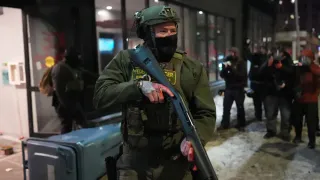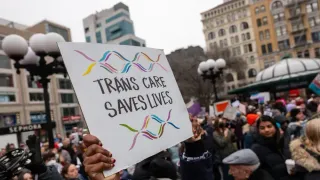December 9, 2017
Clinton Visits SF AIDS Grove
Matthew S. Bajko READ TIME: 4 MIN.
During his first visit to the national AIDS memorial that he federally recognized, former President Bill Clinton urged advocates and those living with HIV to "keep up the fight" against the global epidemic.
Nearly 800 people had gathered inside a tent erected in the meadow of the National AIDS Memorial Grove in San Francisco's Golden Gate Park the morning of Friday, December 1, to hear Clinton give the keynote address at the grove's annual World AIDS Day commemoration. In 1996 Clinton signed legislation spearheaded by Congresswoman Nancy Pelosi (D-San Francisco) that designated the local park's deLaveaga Dell as a national memorial.
During his 35-minute speech, Clinton, 71, recalled how, in the summer of 1971, while his now wife, Hillary Clinton, worked for an Oakland law firm, he would walk throughout San Francisco and often through the park. He also noted, for those who didn't live through the onset of the AIDS epidemic in the 1980s, "when people started dropping like flies," how horrible those times were.
Back then, said Clinton, "San Francisco was virtually the only place in America for gay people to come and find a safe place and not be harassed."
He refuted those who, to this day, mock the city's acceptance and embrace of the LGBT community as somehow being against American values. Rather, argued Clinton, San Francisco's diverse population represents "a cauldron out of which you can make beautiful things happen."
The theme of this year's event was "Bending the Arc Toward Justice," a reference to an oft-quoted line from a speech given by the late civil rights leader the Reverend Dr. Martin Luther King Jr. In today's supercharged news cycle, Clinton beseeched the audience to ignore the latest developments and instead focus on the future.
"There is a difference between the headlines and the trend line," he said.
Clinton only briefly mentioned the work his eponymously named foundation is doing to address AIDS on the global stage. Instead, he focused mostly on the past during his speech, noting when he was governor of Arkansas the chairs of the state's Republican and Democratic parties were both gay men. When the Democrat was sick with AIDS in the hospital, his body covered in black sores due to Kaposi's sarcoma, Clinton recalled how helpless he and his wife felt.
"There was not a single solitary thing any of us could do except give comfort to him," said Clinton. "Hillary and I had a lot of friends like that."
When he was given the chance to sign into law the bill creating the National AIDS Memorial Grove, Clinton said he was "honored to do it. People hatched this idea in 1988 when America was still in the dark. That was 29 years ago, soon to be 30, but the arc was bending."
John Cunningham, the grove's executive director, said the memorial was created with the purpose of "honoring all the lives lost and supporting the survivors."
Clinton's historic visit to the grove was overshadowed by the flood of recent reports about powerful men in politics, entertainment, business, and the news media being accused of sexual harassment, and in some cases, assault and rape. Multiple women have accused Clinton of sexual harassment, with one accuser's lawsuit against him leading to his impeachment by the House of Representatives in December 1998, though the Senate later acquitted him.
Local media were told Clinton would not grant any interviews while in San Francisco, and the dedication of a large boulder honoring him at the entrance of the grove's Moonwalk staircase was kept off-limits to both the press and the general public.
While the national conversation about sexual harassment "is long overdue," said gay District 8 Supervisor Jeff Sheehy, he did not believe Clinton should have canceled his visit due to his own history of accusations leveled against him.
"He has done a tremendous amount of work on HIV and AIDS," noted Sheehy, the first openly HIV-positive person to serve on the board.
Chris Verdugo, a gay man who is executive director of the San Francisco Gay Men's Chorus, said he found Clinton's visit "remarkable" but added his main reason for attending the ceremony was to honor the more than 300 members of the chorus who have died due to AIDS over the years.
The chorus "is looking to have a presence honoring all of our members who have moved on because of the AIDS epidemic here at the grove next year," said Verdugo, though he declined to provide specifics about what it would entail.
As for Sheehy, he told the B.A.R. he attended the event not only to honor all of the people he knew who were lost to AIDS but also the sacrifices many have made to get the city to the point where it is close to ending the transmission of new HIV cases.
As the city nears "the last mile" in reaching its goal, Sheehy said he worries "we may take our foot off the pedal."
San Francisco resident Patrick Miska, 63, who has lived with HIV since the early 1980s, and his late partner, Doug Bond, who was also HIV-positive and died on August 14, 2004, often walked their dogs through the grove during the decade they spent together. It is where Miska scattered Bond's ashes and would like for his own ashes to be scattered one day.
He routinely visits the AIDS grove to remember Bond and annually attends the World AIDS Day event.
"There is something really special about it," said Miska, adding that, "we are very lucky to have a very beautiful grove."






